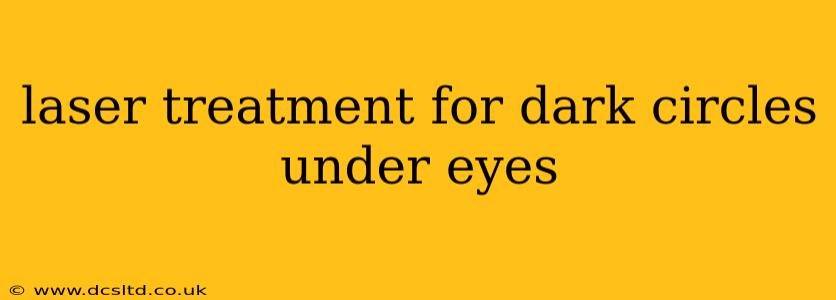Dark circles under the eyes are a common cosmetic concern affecting millions. While genetics, aging, and lifestyle factors contribute, laser treatment offers a promising solution for many. This comprehensive guide explores laser treatment options, their effectiveness, potential risks, and what to expect during and after the procedure.
What Causes Dark Circles Under Eyes?
Before diving into treatment, understanding the root cause is crucial. Dark circles can stem from several factors:
- Genetics: Inherited skin tone and thin skin under the eyes can make blood vessels more visible, resulting in dark circles.
- Aging: As we age, skin loses collagen and elastin, leading to thinner skin and increased visibility of underlying blood vessels and pigment.
- Sun Exposure: UV radiation damages skin, increasing pigmentation and contributing to dark circles.
- Lack of Sleep: Sleep deprivation can cause blood vessels to dilate, making them more prominent.
- Allergies: Allergic reactions can cause inflammation and darkening under the eyes.
- Dehydration: Insufficient water intake can lead to dull, dry skin, accentuating dark circles.
What Types of Laser Treatments Are Used for Dark Circles?
Several laser technologies target different aspects of dark circles:
-
Nd:YAG Laser: This laser targets the blood vessels contributing to the bluish or purplish hue of dark circles. It works by heating and sealing off these vessels, reducing their visibility.
-
Fractional CO2 Laser: This laser stimulates collagen production, improving skin texture and reducing the appearance of wrinkles and fine lines around the eyes, indirectly lightening dark circles.
-
Intense Pulsed Light (IPL): IPL therapy uses broad-spectrum light to target pigment and blood vessels, improving the overall tone and appearance of the skin around the eyes.
-
Erbium:YAG Laser: This laser is known for its precision and can effectively target pigmentation while minimizing damage to the surrounding skin.
How Effective Is Laser Treatment for Dark Circles?
The effectiveness of laser treatment for dark circles varies depending on the underlying cause and the individual's response to treatment. While it's not a guaranteed solution for everyone, many patients experience significant improvement in the appearance of their dark circles. Multiple sessions are often required to achieve optimal results.
What Are the Potential Risks and Side Effects of Laser Treatment for Dark Circles?
Like any medical procedure, laser treatment for dark circles carries potential risks and side effects, including:
- Swelling: Swelling is a common side effect, usually resolving within a few days.
- Bruising: Minor bruising is also possible.
- Redness: Redness around the treated area is expected and typically fades within a few days to a week.
- Hypopigmentation or Hyperpigmentation: In rare cases, the skin may become lighter (hypopigmentation) or darker (hyperpigmentation) than the surrounding skin.
- Infection: The risk of infection is minimal but can occur if proper aftercare instructions are not followed.
What to Expect During and After Laser Treatment?
During Treatment: The procedure is usually performed in a doctor's office or clinic. A topical anesthetic cream may be applied to numb the area before treatment. The laser treatment itself takes a relatively short time.
After Treatment: You may experience some swelling, redness, and bruising. Your doctor will provide specific aftercare instructions, which usually include:
- Applying cold compresses to reduce swelling.
- Using prescribed creams or ointments to aid healing.
- Avoiding sun exposure for a specified period.
- Following up with your doctor for post-treatment assessments.
How Much Does Laser Treatment for Dark Circles Cost?
The cost of laser treatment for dark circles varies depending on factors such as the type of laser used, the number of sessions needed, and the geographical location. It's best to consult with a dermatologist or a qualified cosmetic surgeon to get a personalized cost estimate.
How Long Do the Results of Laser Treatment Last?
The longevity of results varies among individuals. Maintaining a healthy lifestyle, including sufficient sleep, hydration, and sun protection, can help prolong the effects of the treatment. However, touch-up sessions may be necessary over time, especially as the aging process continues.
Is Laser Treatment for Dark Circles Right for Me?
Laser treatment can be a very effective option for some, but it's not a one-size-fits-all solution. Consulting with a qualified dermatologist or plastic surgeon is essential to determine if laser treatment is appropriate for your specific situation and to discuss alternative options if necessary. They will assess your skin type, the cause of your dark circles, and your overall health before recommending a course of action. They can also help you manage expectations and understand the potential benefits and risks.
